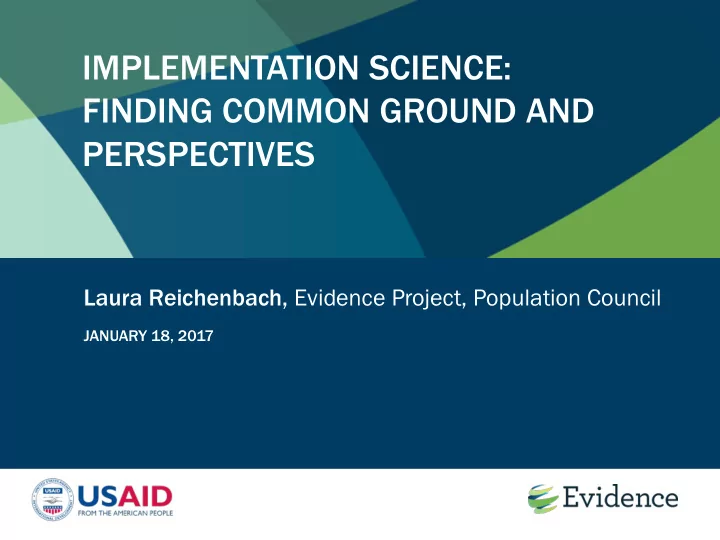

IMPLEMENTATION SCIENCE: FINDING COMMON GROUND AND PERSPECTIVES Laura Reichenbach, Evidence Project, Population Council JANUARY 18, 2017
Rationale for Implementation Science § Despite advances in public health, delivering proven interventions remains a challenge – ‘Know-Do’ gap § Failure of many health policies, programs and practices outside of controlled settings of research trials and small pilots § Requires better understanding and response to the complexity of the implementation process § Limited resources create pressure for utilization and uptake
Range of Definitions of Implementation Science Application of systematic learning, research and evaluation to improve health practice, policy and programs. –USAID, GH, n.d. Implementation science is the study of methods to promote the integration of research findings and evidence into healthcare policy and practice. –NIH/FIC The study of methods to improve the uptake, implementation, and translation of research findings into routine and common practices. –PEPFAR Effective IRDS involves using scientific methods to address the challenges of implementation and scale-up. IRDS draws upon the methods, tools, and approaches for: enhancing equity and efficiency, promoting a culture of evidence-informed learning, engaging stakeholders, and improving decisions on policies and programs to achieve better health outcomes. IRDS is a type of health policy and systems research that draws on many traditions and disciplines of research and practice. It builds on operations research, participatory action research, management science, quality improvement, implementation science, and impact evaluation. –STATEMENT ON IRDS Implementation research is the scientific inquiry into questions concerning implementation—the act of carrying an intention into effect, which in health research can be policies, programmes, or individual practices (collectively called interventions). –PETERS ET AL. 2013. BMJ.
Range of Definitions of Implementation Science Application of systematic learning, research and evaluation to improve health practice, policy and programs. –USAID, GH, n.d. Implementation science is the study of methods to promote the integration of research findings and evidence into healthcare policy and practice. –NIH/FIC The study of methods to improve the uptake, implementation, and translation of research findings into routine and common practices. –PEPFAR Effective IRDS involves using scientific methods to address the challenges of implementation and scale-up. IRDS draws upon the methods, tools, and approaches for: enhancing equity and efficiency, promoting a culture of evidence-informed learning, engaging stakeholders, and improving decisions on policies and programs to achieve better health outcomes. IRDS is a type of health policy and systems research that draws on many traditions and disciplines of research and practice. It builds on operations research, participatory action research, management science, quality improvement, implementation science, and impact evaluation. –STATEMENT ON IRDS Implementation research is the scientific inquiry into questions concerning implementation—the act of carrying an intention into effect, which in health research can be policies, programmes, or individual practices (collectively called interventions). –PETERS ET AL. 2013. BMJ.
Range of Definitions of Implementation Science Application of systematic learning, research and evaluation to improve health practice, policy and programs. –USAID, GH, n.d. Implementation science is the study of methods to promote the integration of research findings and evidence into healthcare policy and practice. –NIH/FIC The study of methods to improve the uptake, implementation, and translation of research findings into routine and common practices. –PEPFAR Effective IRDS involves using scientific methods to address the challenges of implementation and scale-up. IRDS draws upon the methods, tools, and approaches for: enhancing equity and efficiency, promoting a culture of evidence-informed learning, engaging stakeholders, and improving decisions on policies and programs to achieve better health outcomes. IRDS is a type of health policy and systems research that draws on many traditions and disciplines of research and practice. It builds on operations research, participatory action research, management science, quality improvement, implementation science, and impact evaluation. –STATEMENT ON IRDS Implementation research is the scientific inquiry into questions concerning implementation—the act of carrying an intention into effect, which in health research can be policies, programmes, or individual practices (collectively called interventions). –PETERS ET AL. 2013. BMJ.
Goal of Implementation Science Accelerate adoption and integration of evidence-informed interventions to change practice patterns, health behaviors, and inform public health policy decisions that ultimately will lead to lasting and improved health impact at scale.
What sets implementation science apart? § Multidisciplinary and transdisciplinary § Main outcomes are factors such as acceptability, adoption, feasibility, appropriateness, fidelity, coverage, equity, sustainability, and costs § Takes place in ‘real world’ rather than controlled settings § Strong focus on context – Political, social, economic, cultural – Understand how contextual factors influence implementation § Central role of implementers and users – Engaged throughout the IS process § Flexible and adaptive § Focus on research utilization
Challenges with Implementation Science § Confusion over what constitutes implementation science § Implementation may not be seen as a scientific issue by policy makers and practitioners § Research community may not view implementation science as part of their role § Brings together un-natural partners – Little natural contact between researchers and implementers – Qualitative and quantitative researchers live in different worlds (different departments, techniques, languages) § Funding streams § Methodologically challenging
Thank You The Evidence Project is made possible by the generous support of the American people through the United States Agency for International Development (USAID) under the terms of cooperative agreement no. AID-OAA-A-13-00087. The contents of this presentation are the sole responsibility of the Evidence Project and Population Council and do not necessarily reflect the views of USAID or the United States Government. The Evidence Project uses implementation science—the strategic generation, translation, and use of evidence—to strengthen and scale up family planning and reproductive health programs to reduce unintended pregnancies worldwide. The project is led by the Population Council in partnership with INDEPTH Network, International Planned Parenthood Federation, Management Sciences for Health, PATH, Population Reference Bureau, and a University Resource Network.
Recommend
More recommend